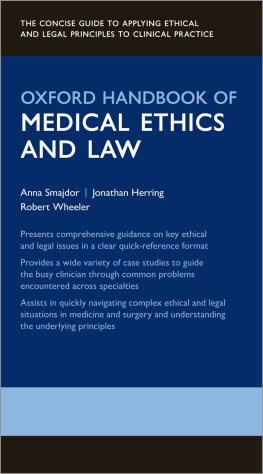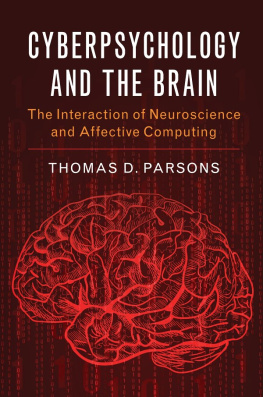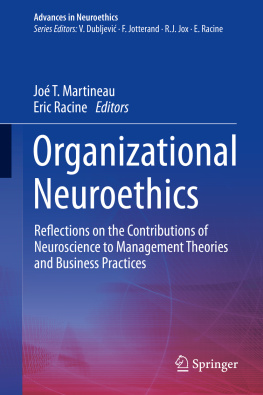THE OXFORD HANDBOOK OF
NEUROETHICS
THE OXFORD HANDBOOK OF
NEUROETHICS
Edited by
JUDY ILLES
and
BARBARA J. SAHAKIAN
Assistant Editors
CAROLE A. FEDERICO
and
SHARON MOREIN-ZAMIR


Great Clarendon Street, Oxford OX2 6DP
Oxford University Press is a department of the University of Oxford.
It furthers the Universitys objective of excellence in research, scholarship,
and education by publishing worldwide in
Oxford New York
Auckland Cape Town Dar es Salaam Hong Kong Karachi
Kuala Lumpur Madrid Melbourne Mexico City Nairobi
New Delhi Shanghai Taipei Toronto
With offices in
Argentina Austria Brazil Chile Czech Republic France Greece
Guatemala Hungary Italy Japan Poland Portugal Singapore
South Korea Switzerland Thailand Turkey Ukraine Vietnam
Oxford is a registered trade mark of Oxford University Press
in the UK and in certain other countries
Published in the United States
by Oxford University Press Inc., New York
Oxford University Press 2011
materials () in this book prepared by the authors as part of their
official duties as U.S. government employees are not covered by copyright.
The moral rights of the authors have been asserted
Database right Oxford University Press (maker)
First published 2011
All rights reserved. No part of this publication may be reproduced,
stored in a retrieval system, or transmitted, in any form or by any means,
without the prior permission in writing of Oxford University Press,
or as expressly permitted by law, or under terms agreed with the appropriate
reprographics rights organization. Enquiries concerning reproduction
outside the scope of the above should be sent to the Rights Department,
Oxford University Press, at the address above
You must not circulate this book in any other binding or cover
and you must impose this same condition on any acquirer
British Library Cataloguing in Publication Data
Data available
Library of Congress Cataloguing in Publication Data
Library of Congress Control Number: 2011922176
Typeset by Glyph International Bangalore, India
Printed in Great Britain
on acid-free paper by
CPI Antony Rowe, Chippenham, Wiltshire
ISBN 978-0-19-957070-6
1 3 5 7 9 10 8 6 4 2
Whilst every effort has been made to ensure that the contents of this book are as complete,
accurate and up-to-date as possible at the date of writing, Oxford University Press is not
able to give any guarantee or assurance that such is the case. Readers are urged to take
appropriately qualified medical advice in all cases. The information in this book is
intended to be useful to the general reader, but should not be used as a means of
self-diagnosis or for the prescription of medication.
FOREWORD
BRIDGING NEUROSCIENCE AND SOCIETY: RESEARCH, EDUCATION, AND BROAD PUBLIC ENGAGEMENT
ALAN I. LESHNER
INTRODUCTION
ADVANCES in neuroscience are reported widely in the public media, reflecting both the great pace of neuroscientific progress and the extensive interest people have in their own brains, particularly in their minds, and how well they are functioning. This should not be interpreted to imply that there is a deep public understanding of the details of brain or mental functioning, but it does reflect widespread recognition and excitement that scientists are learning more and more as the decades pass about the brain and mind. That high level of public interest in our science is, of course, generally a very good thing.
However, as the public increasingly grasps what science is revealing about the nature of the brain and mental function, some individuals will become less sanguine about what science is revealing. Moreover, the potential use and misuse of various neurotechnologies will likely raise concerns among members of the public. Much of this book is about the current and emerging issues in neuroscience that now or in the future will need attention.
A BROAD SOCIETAL CONTEXT
Since neuroscience is part of the broad science and technology enterprise, some initial comments about the overall sciencesociety relationship are relevant as context for understanding what could happen with neuroscience and its rapport with the broader public. Science and technology are embedded in every aspect of modern life, whether at work, at home, at play, or elsewhere in peoples lives. An obvious consequence is that in order to thrive in the modern world, people need a fundamental understanding and comfort with science and technology. That does not mean that all people need to understand the details of most scientific discoveries and issues, but they do need to understand the nature of science, its power and limits, and they need to be able to discriminate science from pseudo-science.
Moreover, every major problem or issue that modern society faces has a science and technology componenteither as a cause or a cure. Obvious examples include balancing energy needs with a sustainable environment, the equitable distribution of such resources as water and fertile land, controlling the spread of infectious diseases and ensuring adequate health, and sustaining a viable economy in the world of the future. To deal with those kinds of problems on either a global or a national scale requires that modern countries have at least some significant science and technology capacity, which in turn requires broad public recognition, understanding, and support. These intersecting forces require that the relationship between science and the rest of society be mutually beneficial and strong.
In contrast, the last few decades have been rather Dickensian for science and its relationship with the rest of societythe best of times and the worst of times. On the positive side, scientific advances continue at a very rapid pace. The case of neuroscience is particularly striking; examples can be found throughout this book. For nearly 40 years scientists have been able to credibly maintain that we have learned more about the brain in the past decade than in all of recorded history. Some of these advances have been incremental in character, building systematically on past knowledge, whereas others have appeared more transformative. Many of the most transformative advances have been fueled by the availability of new technologies, like molecular genetics, information and communication technologies, and neuroimaging. The advent of these new technologies has enabled us to ask wholly new questions that could not have been approached before.
We also are seeing great progress in the diagnosis, prevention, and treatment of nervous system disorders, as basic, translational, and clinical neuroscience increasingly inform each other. And neuroscience advances have had significant public and policy implications, as we revise our conceptualization of such illnesses as mental and substance abuse disorders, recognizing their biological origins in brain dysfunction. For example, the policy implications of the recognition that addiction is fundamentally a health issue, a brain disease, are far-reaching.
That is the good news. In contrast, although the last decades have been among the scientifically most productive, they also have been among the rockiest in modern times for the overall sciencesociety relationship. Although it is true that every attitude survey continues to show that, overall, the public has great respect for science and scientists, and that most people believe the benefits of science have outweighed its risks or harms, many people find particular scientific advances disquieting or even dangerous. This is discussed later in this Foreword.











